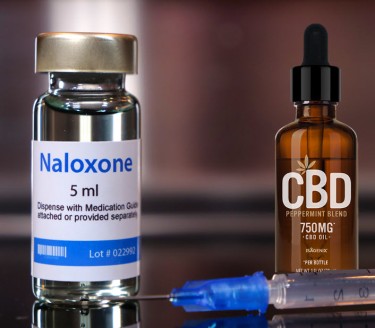
The drug naloxone serves as a crucial lifesaving remedy against opiate drug overdoses, including substances like fentanyl. Studies indicate that naloxone has resulted in a 75-100% survival rate among overdose victims who received treatment with it. Marketed as Narcan and included in overdose-prevention kits, this medication has saved tens of thousands of lives.
Presently, scientists are actively investigating the possibility of augmenting naloxone’s efficacy by integrating derivatives of cannabidiol (CBD), a compound present in cannabis. Ongoing research aims to ascertain whether CBD derivatives can amplify the lifesaving abilities of naloxone even further.
What Is Fentanyl?
Fentanyl, a synthetic opioid, possesses a potency that surpasses heroin by up to 50 times and morphine by 100 times. This significantly contributes to fatal and nonfatal overdoses in the United States.
There exist two types of fentanyl: pharmaceutical fentanyl and illegally manufactured fentanyl. Both fall under the category of synthetic opioids. Pharmaceutical fentanyl is legitimately prescribed by medical professionals to manage severe pain, particularly after surgeries or for patients with advanced-stage cancer.
However, most recent fentanyl-related overdose cases are associated with illegally produced fentanyl. Illicitly distributed through illegal drug markets, it is sought after for its heroin-like effects. This dangerous substance is often mixed with other drugs due to its incredible potency, leading to cheaper, more potent, addictive, and ultimately more dangerous combinations.
Fentanyl and Overdose
Fentanyl and other synthetic opioids are responsible for the highest overdose deaths. Even in minute quantities, fentanyl can prove lethal, with over 150 individuals succumbing to synthetic opioid-related overdoses daily.
A dangerous aspect of fentanyl is that drugs may contain deadly levels without visible taste or odor clues. Detecting fentanyl in drugs is exceedingly difficult unless you utilize fentanyl test strips.
These budget-friendly test strips usually yield results within 5 minutes, making them potentially lifesaving. However, caution’s imperative since certain test strips may not identify extremely potent fentanyl-like drugs like carfentanil. Therefore, remaining vigilant is essential, even if the test yields a negative result.
Combining Naloxone and CBD
Naloxone works by competing for opioid receptor sites in the brain with opiates such as heroin and morphine. This mechanism successfully blocks the central nervous system’s depressing effects of opioids, reducing the potential halt of breathing that may happen with an overdose.
However, fentanyl exhibits a high affinity for these receptor sites, sometimes necessitating multiple doses of Narcan (naloxone) to prevent overdoses. According to Dr. Alex Straiker, the other primary investigator of the research and a fellow scientist at Indiana University Bloomington, CDC guidelines indicate that fentanyl overdoses may necessitate more than one Narcan dose. Synthetic opioids, including fentanyl, are responsible for over 80% of opiate overdoses.
In response to this challenge, a higher dose of Narcan was approved to address the increasing number of deaths related to synthetic opioids. This was particularly significant as cities like Dayton reported instances where multiple expended ampoules of naloxone were found alongside bodies.
Previous research indicates that CBD may interfere with opioid binding by altering the shape of receptor sites, potentially enhancing the effectiveness of naloxone treatment. Dr. Straiker emphasizes the importance of exploring alternative approaches since naloxone remains the sole drug to reverse opioid overdoses.
Combating Fentanyl Overdose
Indiana University researchers have uncovered a promising breakthrough in treating drug overdoses, particularly from substances like fentanyl. Their study, featured in the Journal of Medicinal Chemistry on July 12, focuses on a modified form of cannabidiol, a cannabis-derived compound that may reverse overdose effects.
The researchers are optimistic that this discovery could pave the way for a novel approach to countering overdoses, either by developing a new product or by synergizing with naloxone, the widely used antidote for opiate overdoses.
The Canadian government’s data reveals that approximately 20 people die daily from apparent opioid toxicity, with synthetic opioids, notably fentanyl, playing a significant role. While naloxone has been effective against opiate overdoses, it proves less potent when combating synthetic opioids within the fentanyl category.
To reverse the effects of an overdose, the body’s opioid receptors require an alternative binding partner. The researchers found that synthetic opiates, including fentanyl, bind tightly to these receptors, making it challenging for naloxone to compete effectively.
In a fentanyl overdose, naloxone and fentanyl bind to different receptor sites, resulting in no competition. To address this, the researchers explored the potential of a negative allosteric modulator, aiming to reverse the effects of fentanyl and its impact on opioid receptors.
As per the University of Michigan, an allosteric modulator is a molecule that interacts with other molecules to influence their behavior.
To identify a potential solution for countering the effects of fentanyl, researchers evaluated 50 chemical compounds through experimentation. Among these compounds, cannabidiol (CBD) demonstrated the ability to act as a negative allosteric modulator at the binding site. However, initial testing required high concentrations of CBD.
After making modifications to enhance CBD’s effectiveness, researchers successfully reversed the effects of fentanyl in blood or tissue samples.
“We’ve pinpointed essential structural components responsible for the desired antidote effect,” explained Straiker. “Some of these compounds exhibit much greater potency than the lead compound. We’ve collaborated with another laboratory to model the binding site, which could aid in identifying additional promising compounds for further study.”
The next crucial phase, as outlined in the study, involves testing these findings on live subjects to ascertain their ability to reverse respiratory depression, a critical aspect of drug overdoses.
Conclusion
The research conducted by Indiana University on a modified form of cannabidiol (CBD) as a potential antidote for fentanyl overdose holds excellent promise. The study’s findings highlight the potential of CBD as a negative allosteric modulator capable of countering the effects of fentanyl. Further advancements in testing and modifications have shown encouraging results in reversing fentanyl’s impact on blood and tissue samples.
As the research progresses, the next critical step involves testing these promising findings on live subjects to determine whether CBD can effectively reverse respiratory depression during drug overdoses. The potential implications of this breakthrough could pave the way for a novel approach to combating fentanyl-related overdoses and saving lives in the future.
OVERDOSES IN AMERICA, READ ON…
HOW MANY PEOPLE OVERDOSE IN AMERICA EACH YEAR?
- SEO Powered Content & PR Distribution. Get Amplified Today.
- PlatoData.Network Vertical Generative Ai. Empower Yourself. Access Here.
- PlatoAiStream. Web3 Intelligence. Knowledge Amplified. Access Here.
- PlatoESG. Automotive / EVs, Carbon, CleanTech, Energy, Environment, Solar, Waste Management. Access Here.
- BlockOffsets. Modernizing Environmental Offset Ownership. Access Here.
- Source: http://cannabis.net/blog/medical/a-narcan-shot-for-a-fentanyl-overdose-but-can-cbd-reverse-any-fentanyl-damage-in-your-body




